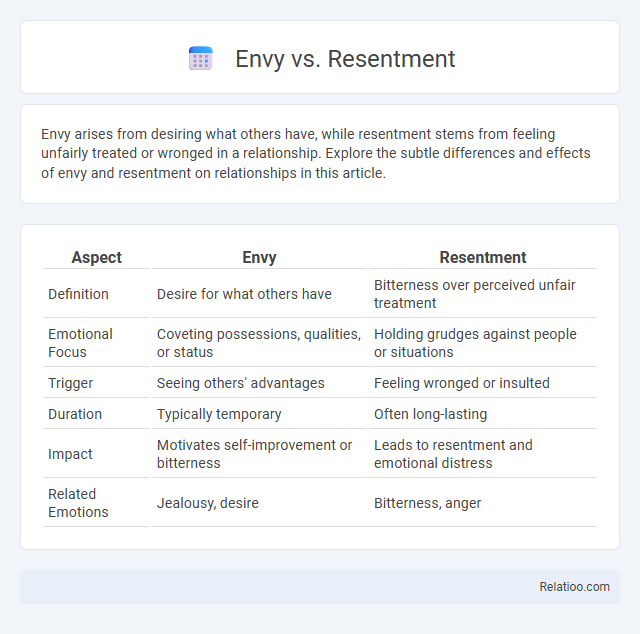Envy arises from desiring what others have, while resentment stems from feeling unfairly treated or wronged in a relationship. Explore the subtle differences and effects of envy and resentment on relationships in this article.
Table of Comparison
| Aspect | Envy | Resentment |
|---|---|---|
| Definition | Desire for what others have | Bitterness over perceived unfair treatment |
| Emotional Focus | Coveting possessions, qualities, or status | Holding grudges against people or situations |
| Trigger | Seeing others' advantages | Feeling wronged or insulted |
| Duration | Typically temporary | Often long-lasting |
| Impact | Motivates self-improvement or bitterness | Leads to resentment and emotional distress |
| Related Emotions | Jealousy, desire | Bitterness, anger |
Understanding the Definitions: Envy vs Resentment
Envy involves longing for what someone else possesses, such as their success, qualities, or possessions, while resentment arises from perceived unfair treatment or injustice, often harboring bitterness toward the source of that grievance. Your ability to distinguish envy as desire and resentment as anger helps clarify emotional responses and manage interpersonal dynamics effectively. Understanding these definitions enhances emotional intelligence by identifying motivations behind feelings toward others.
Origins and Psychological Roots of Envy
Envy originates from a sense of lacking what others possess, often triggered by comparison and feelings of inferiority. Its psychological roots lie in social and evolutionary mechanisms designed to motivate self-improvement but can lead to destructive emotions when unchecked. Understanding your envy involves recognizing these internal conflicts and distinguishing it from resentment, which stems from perceived unfairness or injustice rather than mere desire for what others have.
How Resentment Develops Over Time
Resentment develops over time through repeated feelings of injustice or perceived unfair treatment, often growing from unresolved envy when your desires and expectations are unmet. Unlike fleeting envy, which can be a brief reaction to someone else's advantages, resentment builds as negative emotions accumulate and fester. Understanding the slow buildup of resentment helps you address underlying issues before they intensify into lasting emotional burdens.
Key Differences Between Envy and Resentment
Envy involves desiring something someone else possesses, often linked to admiration or longing, while resentment arises from perceived unfair treatment or injustice, causing bitterness and grudges. Envy focuses on personal desires lacking what others have, whereas resentment centers on emotional responses to harm or offense. These distinct emotional experiences drive different psychological and social behaviors, highlighting their key differences.
Emotional and Behavioral Signs of Envy
Emotional signs of envy include feelings of inferiority, bitterness, and longing for what others possess, often accompanied by anxiety or dissatisfaction. Behavioral signs manifest as subtle undermining, passive-aggressive actions, or excessive comparison with others to elevate self-worth. Envy can lead to decreased motivation or secretive attempts to acquire the envied traits, distinguishing it from resentment, which usually involves prolonged anger and blame.
Recognizing Resentment in Relationships
Recognizing resentment in relationships involves identifying persistent feelings of bitterness and unresolved anger toward someone, often stemming from unmet expectations or perceived unfair treatment. Unlike envy, which is the desire for what another person has, or jealousy, which involves fear of losing something to another, resentment festers quietly and can undermine trust and communication between partners. Understanding these differences helps you address the root causes and work toward healthier, more honest interactions.
The Impact of Envy on Personal Well-being
Envy significantly undermines personal well-being by fostering negative emotions such as anxiety, low self-esteem, and chronic dissatisfaction. Unlike resentment, which often arises from perceived unfair treatment, envy specifically drives harmful social comparisons that erode happiness and mental health. Understanding the psychological effects of envy can help individuals develop healthier emotional responses and improve overall life satisfaction.
How Resentment Damages Mental Health
Resentment, unlike envy and jealousy, involves prolonged bitterness and anger toward perceived injustices, which can lead to chronic stress and anxiety disorders. This persistent negative emotion affects mental health by increasing cortisol levels, disrupting sleep patterns, and impairing emotional regulation. Over time, unresolved resentment contributes to depression, reduced cognitive function, and diminished overall well-being.
Strategies to Overcome Envy and Resentment
Overcoming envy involves cultivating gratitude and focusing on personal growth rather than comparing oneself to others, while resentment requires addressing underlying grievances through open communication and forgiveness. Practicing mindfulness helps identify and regulate these emotions, reducing their impact on mental health. Implementing positive affirmations and seeking social support also promotes emotional resilience, effectively diminishing envy and resentment.
Fostering Healthy Emotions: Moving Beyond Envy and Resentment
Fostering healthy emotions involves recognizing the distinct nature of envy, resentment, and jealousy to better manage their impact on mental well-being. Envy arises from wanting what others have, resentment stems from perceived unfair treatment, and jealousy involves fear of loss or rivalry, each requiring different coping strategies. Developing self-awareness, practicing gratitude, and engaging in open communication can help transform these emotions into opportunities for personal growth and positive relationships.

Infographic: Envy vs Resentment
 relatioo.com
relatioo.com